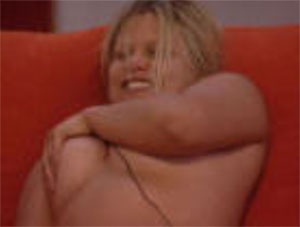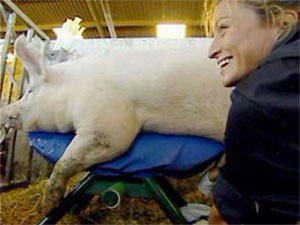|
|
||||||||
|
||||||||
Faking It – Reality shows are the least real thing on TV Black and white surfers ride froth-tipped waves to the pounding rhythms of Leftfield; a Gene Kelly look-a-like body-pops his way through a Singin’ In The Rain pastiche. Adverts like these are more than just sales tools for Guinness and Volkswagen - they are works of modern art. A contradiction in terms, it seems, given art’s connotations of integrity – after all, who ever heard of honesty in advertising? But the truth is, the publicity industry gets a bad press. If you’re looking for real dishonesty on TV, look no further than the reality shows. ‘24 hour streaming and web cams mean the true reality junkie now need never be without their fix.’ At first glance, of course, reality TV appears to be getting more real by the day. As our addiction to these shows has increased, we’ve required our ‘hits’ to become harder, leading to increasingly unrestricted access to ever more extreme content – a state of affairs that climaxed with the sight of BB housemate Kinga simulating sex with a wine bottle on our screens last summer. But it’s not just the content, even the way we consume these shows has stepped up a level - 24 hour streaming and web cams mean the true reality junkie now need never be without their fix.
It seems, then, that we are moving closer to a “pure”, unmediated reality – where the viewer will be able to spy on other people’s lives without restriction. Seen in that context, Internet phenomenon ‘You Tube’ is a glimpse of the future: a gargantuan online repository of reality, where ordinary people can post video clips of their everyday lives in all their banality. (PICS) But the reality these shows are selling us is a lie. From the painstaking casting of the participants, through to the carefully manipulated narratives of the show, and finishing with the meticulous fine-tuning of the edit, barely a single aspect of the process is left to chance - allowing the producers licence to portray a show’s participants in whichever light they choose. Add to this the common practice of getting participants in observational documentaries to act out scenarios to the director’s specification, and of getting re-takes of genuine reactions that just didn’t seem ‘genuine’ enough, and it becomes abundantly clear that this genre of TV has more in common with fiction than fact. But let’s not blame the reality show’s fraudulence entirely on the producers. Increasingly TV-literate participants are now only too aware of both the processes that go on to make these shows, and the reactions the producers want of them. Turn on the tears, throw a tantrum, court controversy – in short, perform – and you’ll soon be a reality TV star. The very fact these people have an audience of millions negates any chance of genuine reactions and emotions. From Jade flashing her kebab, to Rebecca Loos pleasuring a pig, no act is ever performed without one eye on the camera.
But if reality television is conning us, then where’s the truth to be found? Perversely, the answer may actually lie in the reality shows themselves – or rather, in-between them. Because it’s the adverts punctuating these programmes that, arguably, offer us the most honest viewing experience. ‘Advertising performs the same function that Picasso attributed to art – in lying to us, it make us realise the truth.’ Think about how we engage with advertisements. We watch them, we are seduced by the message they convey, and we determine to buy their product. Not necessarily because of the superficial message, however, but because of the fundamental truth that informs it. We don’t buy that aftershave because we really believe we’ll turn into that male model emerging from the sea to kiss that gorgeous girl on the sand - but we do accept we want to use it to appear more attractive. We don’t buy that mobile phone because we believe we’ll turn into that successful businessman hanging out in a trendy bar - but we do accept we want it to appear more successful. According to this logic, then, the adman isn’t conning us, he’s just giving us what we want. Okay, it’s presented in a slick and superficial way, which may make us choose his product over a competitor’s – but whether it’s Hugo Boss or Calvin Klein, Sony Ericsson or Motorola, there’s a basic truth there. He knows he’s creatively embellished one of our fundamental desires, and so do we. But the fact remains - it’s a fundamental desire. Of course, no advert could ever realistically be called 100% honest. Clearly, there’s the question of whether these basic urges truly are inherent, or partly fostered by a consumer-driven industry that will say and do anything to persuade you that you want stuff. But surely what we’re dealing with here is the distinction between a “dishonest truth”, and an “honest lie”. While reality shows purport to represent reality, they actually counterfeit it; the art of advertising, meanwhile, performs the same function that Picasso attributed to art in general – in lying to us, it makes us realise the truth. And yet, despite all this, eager audiences continue to buy into the myth of reality shows. “Reality is an illusion”, Einstein is reported to have said, “albeit a very persistent one…” With the sixth series of I’m A Celebrity due to start filming later this year, and series seven of Big Brother only weeks away, reality TV’s persistent illusions show no sign of disappearing any time soon. |
|
|||||||
|
||||||||




